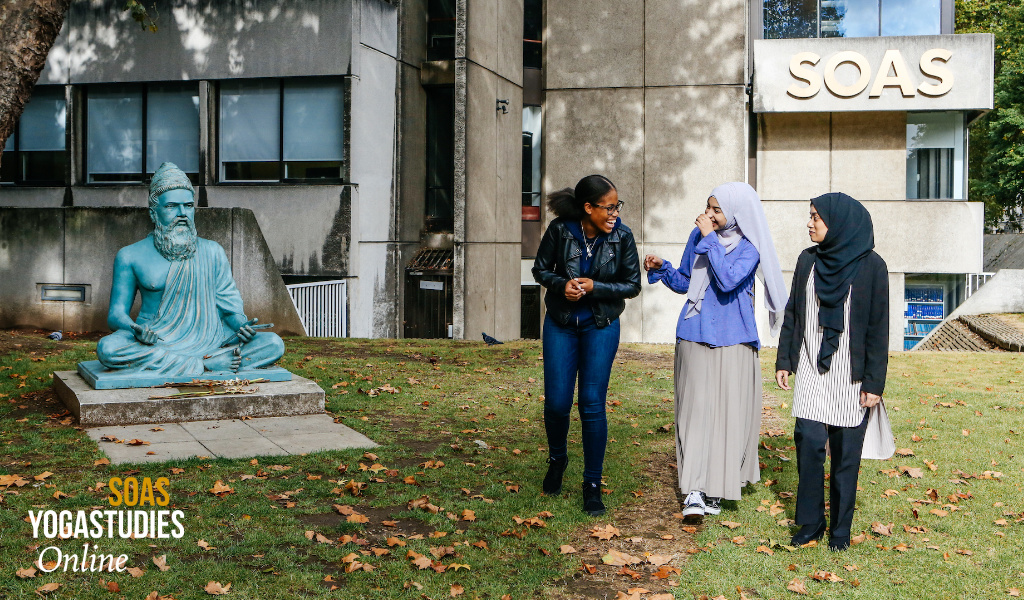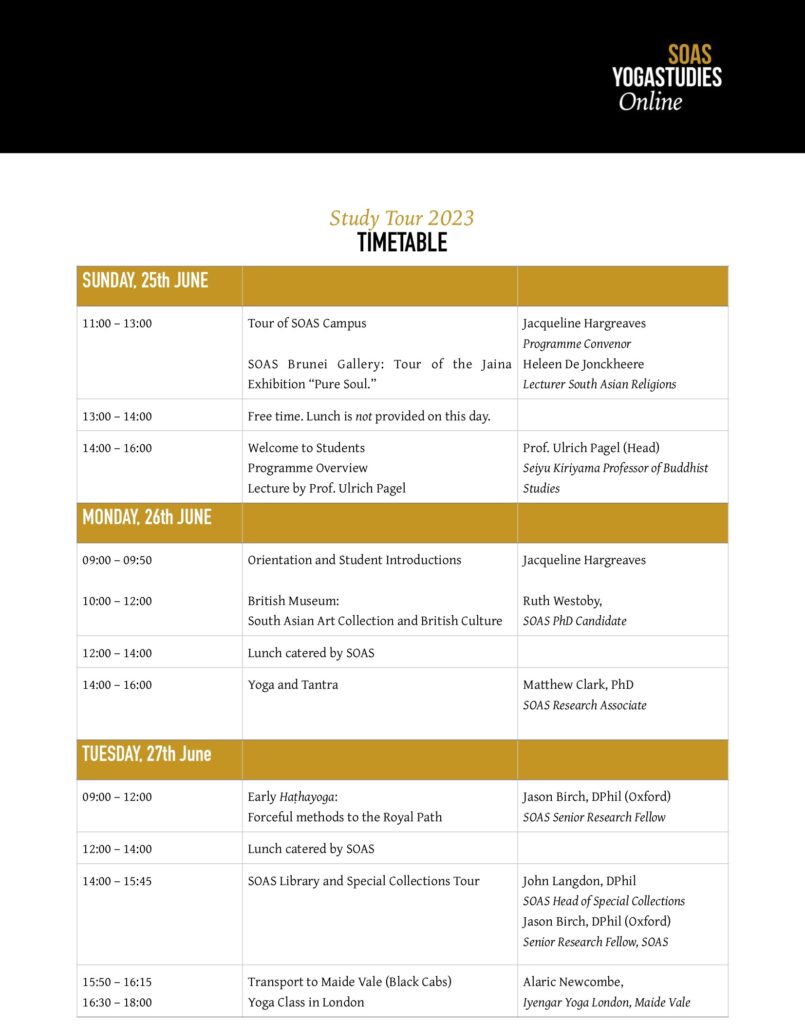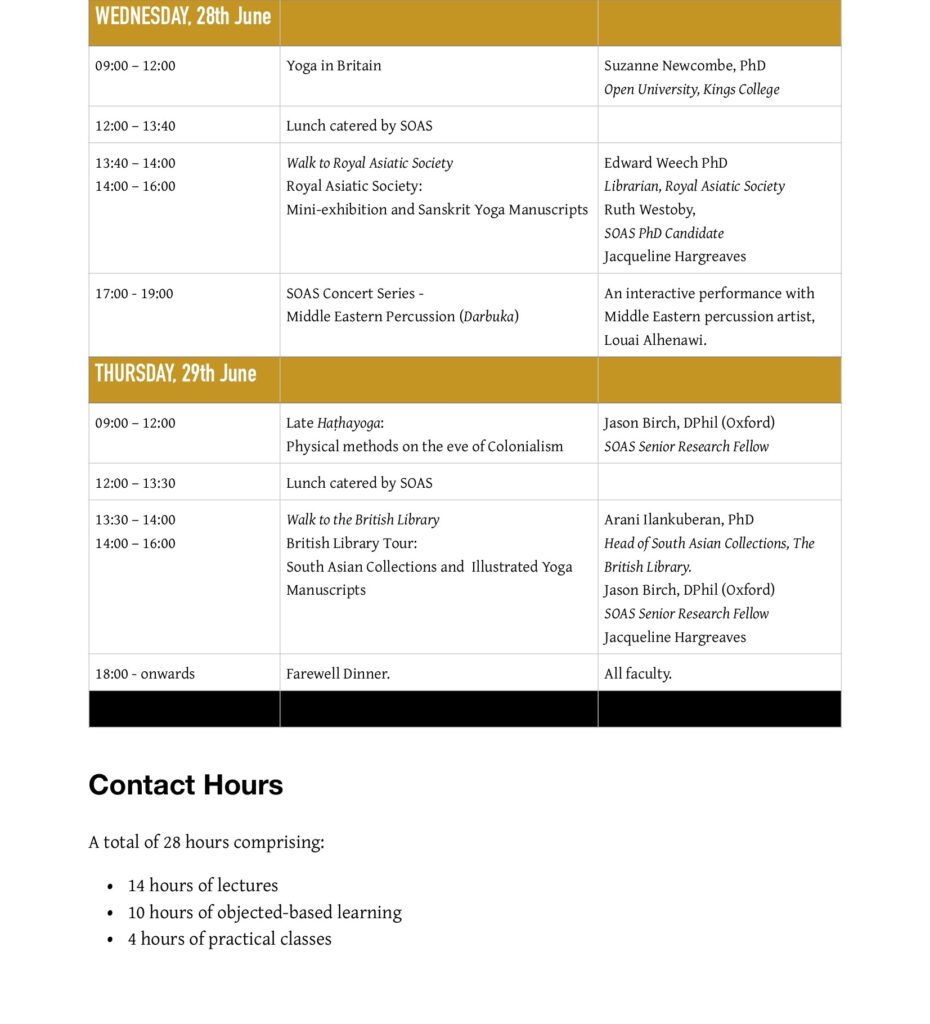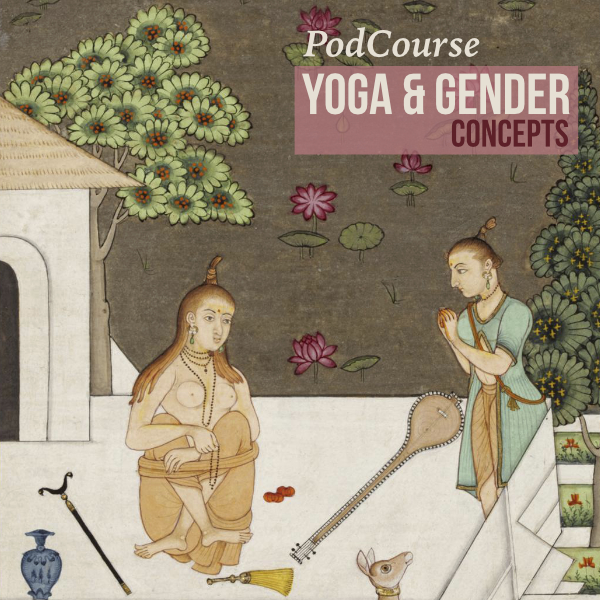

19:00 UTC – 20:30 UTC
Online webinar
SOAS Centre of Yoga Studies is pleased to host Fabrizio Speziale, Professor at the School of Advanced Studies in the Social Sciences (EHESS) and a member of the Center for South Asian and Himalayan Studies (CESAH), Paris-Marseille, for a lecture entitled “The Rāwal: a sect of Muslim yogis in Colonial India.”
In early modern and colonial India, Muslims’ assimilation of knowledge and practices from the yogis was a layered phenomenon where different approaches, which reflected the needs of different groups of Muslim society, coexisted. This lecture looks at the emergence of Muslim branches of Nāth yogis and presents the first stage of an ongoing research on one of them, the Rāwal, which are referred to as a group of ascetics, astrologers and itinerant healers. Their members were renowned for treating cataracts, and according to colonial sources, some regularly visited Europe in the early 20th century to perform this operation. This lecture explores how Muslim yogis were perceived in the Indian society of the colonial period and the professional features of the Rāwal sect, where family played a key role, and women managed family properties when men travelled to perform their itinerant profession.
https://soas-ac-uk.zoom.us/j/94789544325?pwd=a2hTdnVnaExGeGpVUGxVeWtLNGdUUT09
Passcode: KMbCB8HTd4
SOAS Centre of Yoga Studies was honoured to host the online recording of the Haṭhapradīpikā Symposium – Launch of the New Digital Edition that took place at the University of Oxford, Bodleian Weston Library on the 23rd February 2024.
This symposium showcases the collaborative outputs of the Light on Hatha Yoga Project, which was funded by the Arts and Humanities Research Council (AHRC) and the German Research Foundation Deutsche Forschungsgemeinschaft (DFG) from January 2021 to January 2024.
This three-year research project brought together arts and humanities researchers in the UK and Germany to conduct outstanding joint research. The project has produced a digital critical edition and English translation of the Haṭhapradīpikā, authored by Svātmārāma in the early 15th century, which is arguably one of the most widely cited and influential texts on physical yoga, and is instrumental for the flourishing of haṭhayoga on the eve of colonialism.
Building on the success of the five-year ERC-funded Hatha Yoga Project at SOAS University of London, scholars Prof. James Mallinson and Dr Jason Birch of the University of Oxford have collaborated with Prof. Dr Jürgen Hanneder, Dr Mitsuyo Demoto, and Nils Jacob Liersch, PhD Candidate of Philipps-Universität Marburg to produce this critical edition and English translation based on over 200 manuscripts, written in a variety of Indic scripts. The oldest manuscript sourced for the project is dated 1496 CE, which is remarkably close to the date of authorship by Svātmārāma himself.
Beyond the principal investigators and senior researchers, this project has been supported by research assistants at the École française d’Extrême-Orient (EFEO) in Pondicherry, India.
Prof. James Mallinson, University of Oxford (00:00)
Welcome
The Composition of Svātmārāma’s Haṭhapradīpikā.
Nils-Jacob Liersch, MA PhD Candidate, Philipps-Universität Marburg (34:19)
Computer Stemmatics applied to the Haṭhapradīpikā.
Dr Mitsuyo Demoto, Philipps-Universität Marburg (01:04:11)
Development of the various recensions of the Haṭhapradīpikā.
Dr Jason Birch, University of Oxford (01:39:18)
Insights from the New Critical Edition of the Haṭhapradīpikā.
Prof. Jürgen Hanneder, Philipps-Universität Marburg (02:19:19)
Brahmānanda’s Commentary on the Haṭhapradīpikā.
Launch of the New Digital Edition. (02:54:17)
Hathapradipika.online (2024, Language: Sanskrit, English).



SOAS Centre of Yoga Studies was honoured to host a book launch for The Amaraugha and the Amaraughaprabodha of Gorakṣanātha: The Genesis of Haṭha and Rājayoga by Jason Birch (University of Oxford). This is a recording of the lecture, which took place on Monday, 19th February, 2024.
This book introduces, critically edits, and translates one of the earliest texts of the Haṭhayoga tradition, namely the Amaraugha of Gorakṣanātha.
In this talk, Dr Birch will discuss the historical importance of the Amaraugha (12th century), the earliest known work to teach a paradigm that combined Haṭha and Rājayoga. These two yogas represent the basic dichotomy of physical and mental praxis that became a salient feature of medieval yoga traditions and is still something of a touchstone for many practitioners of modern yoga. A close reading of certain passages reveals how physical methods of yoga from a tantric Buddhist tradition were adapted for Śaivas and shifted the emphasis from celibacy to moving kuṇḍalinī.
The Amaraugha was one of the main sources of the Haṭhapradīpikā, which created a template for Haṭhayoga that was widely accepted after the fifteenth century. By looking through the lens of the Haṭhapradīpikā, it is possible to see how the practice of Haṭhayoga evolved after the Amaraugha, and to appreciate the contribution of this early work to traditions of Haṭhayoga in the early modern period.
Jason Birch was awarded his doctorate at the University of Oxford and is a Senior Research Fellow of the Light on Hatha project, hosted at University of Oxford and the University of Marburg, which recently published an online critical edition of the Haṭhapradīpikā (2024). He is co-Director of the Yogacintāmaṇi project at the University of Massachusetts Boston and an Associate Researcher of the Suśruta project at the University of Alberta. His publications include The Amaraugha and the Amaraughaprabodha of Gorakṣanātha: The Genesis of Haṭha and Rājayoga (2024), a co-authored book on plastic surgery in the Nepalese version of the Suśrutasaṃhitā (2023), and numerous articles in academic journals on the history of Haṭha and Rājayoga. From 2015 to 2020, he was a Post-doctoral Research Fellow of the ERC-funded Haṭha Yoga Project at SOAS University of London. He is a founding member of the SOAS Centre of Yoga Studies and the peer-reviewed Journal of Yoga Studies.
The Amaraugha and Amaraughaprabodha of Gorakṣanātha: The Genesis of Haṭha and Rājayoga is available for purchase via the EFEO Pondicherry. (Collection: Collection Indologie, Collection’s number: 157, Edition: EFEO, Institut français de Pondichéry (IFP), Publication date: 2024, Language: English and Sanskrit, Print length: 175 pages.)



To cancel your attendance, please contact us: cys@soas.ac.uk


19:00 UTC – 20:30 UTC
Online webinar
SOAS Centre of Yoga Studies is pleased to host Ayesha A. Irani, Associate Professor of Asian Studies at University of Massachusetts-Boston, for a lecture entitled “Yoga for the Bengali Darveś: Prescriptions of the Jñāna Pradīpa, A Seventeenth-Century Sufi Practice Manual.”
This paper focuses upon the Jñāna Pradīpa (“Lamp of Knowlege”), ascribed to Saiyad Sultān (fl. 1615–1645), the author of the Nabīvaṃśa (“The Prophet’s Lineage”). This Sufi practice manual provides insight into the devotional imaginaire and esoteric practices of the Bengali darveś. Reading the text in the context of other similar Islamic Bangla works suggests that the Sufis of Bengal employed various technologies of haṭha yoga and immortality practices that they recast within an Islamic framework.
https://soas-ac-uk.zoom.us/j/93839193380?pwd=L002ejV1dE5nbzNCaHRaYVF4S1hVUT09
Passcode: WnhbGGa9tf


SOAS Centre of Yoga Studies was honoured to host Dominik A. Haas of the Austrian Academy of Sciences and the University of Vienna, who is author of Gāyatrī: Mantra and Mother of the Vedas (2023). Prof. Ulrich Pagel, Chair of the CYS, hosted the event along with Jacqueline Hargreaves, CYS Programme Manager. This is a recording of the lecture, which took place via an online webinar on Monday, 18th December, 2023.
The mantra known as Gāyatrī or Sāvitrī (Ṛgveda III 62.10) is one of the most frequently recited texts of mankind. Over the course of time it has not only been personified as the mother of the Vedas – the oldest religious literature of South Asia –, but has even come to be venerated as a goddess. It plays an important role in contemporary Hinduism as well as in modern yoga and alternative spiritual currents around the globe. Many consider it the most important, most efficacious, or holiest mantra of all. In this lecture, Dr Haas will present the results of his recently completed book project on the Gāyatrī-Mantra. He will talk about its history between the Vedic Age and modern yoga, focussing on the period between 1000 BCE and 1000 CE, the period in which the mantra rose to become a shibboleth of Brahmanical Hinduism and its deified form was fleshed out.
Dominik A. Haas completed his doctorate in South Asian Studies at the University of Vienna in 2022 with a dissertation on the Gāyatrī mantra. His publications and lectures deal with Hinduism, the Vedic religion, mantras, deification and yoga. Following an interdisciplinary approach, he combines philological and historical research with methods and perspectives from a wide range of disciplines, including text linguistics and religious studies. As a co-founder of the Initiative for Fair Open Access Publishing in South Asian Studies (FOASAS), Haas also advocates for modern forms of scholarly communication and fair working conditions in the academic and publishing sectors. He is currently a Post-Doc fellow and has published a monograph based on his dissertation with the Austrian Academy of Sciences in Contributions to the Cultural and Intellectual History of Asia. In Gāyatrī: Mantra and Mother of the Vedas, Haas reconstructs for the first time the history of the Gāyatrī mantra, which, as the most important initiatory mantra of Brahmanical Hinduism, has played a central role in the formation of social and religious identity for over 2,000 years. Over time, the mantra was not only personified as the mother of the Vedas, the oldest religious literature in South Asia, but was even worshiped as a goddess. In addition to working on his book, Haas is also preparing a new research project that will examine the cultural history of mantras and their recitation. He also leads courses on the topics of mantras and religious history at the University of Vienna.
Gāyatrī: Mantra and Mother of the Vedas is available open access by: Open Access Fonds der Österreichischen Akademie der Wissenschaften. (Pages: 359 pages, Format: 29,7x21cm, Language: English.)

The Study Tour 2023 will provide an extraordinary opportunity for students to meet the faculty of the School and participate in lectures as well as curated object-oriented learning with the foremost scholars of Yoga Studies.
– Jacqueline Hargreaves
SOAS University of London is pleased to announce a Study Tour 2023 exclusively for the students of the 270-hour Yoga and Meditation Education Certificate. The Study Tour 2023 will take place in London at the prestigious campus of SOAS University, which is centred in the heart of Bloomsbury. Students will experience first-hand our facilities and experience the vibrant and unique atmosphere that makes SOAS so special. The campus is located within walking distance of other important educational landmarks such as the British Museum, the British Library, and the Wellcome Institute.
The Study Tour 2023 will provide an extraordinary opportunity for students to meet the faculty of the School and participate in lectures with the foremost scholars of Yoga Studies. We will learn about current research projects, including the methods and outputs, which are continuing to shape our knowledge of the history and practice of Yoga.
We will visit the world’s most important academic library for the study of Asia, Africa, and the Middle East and the Brunei Gallery, which exhibits SOAS’s incredible permanent collection of artworks and objects. We have a formal association with the British Museum, the British Library, and the Royal Asiatic Society, which allows us to offer exceptional access to the collections and curatorial expertise of these institutions. As such, we will engage with object-based study via lectures and contributions from a wide range of leading scholars and curators.
In addition, we will enjoy the talents of the broader SOAS community by listening to a music concert by the School’s music department, participating in a Yoga classes in the vibrant London yoga scene, and enjoy extracurricular activities with the inaugural cohort of students of the Yoga and Meditation Education Certificate.
To begin, on Sunday 25th June, we invite you to meet us at the front stairs of the SOAS Brunei Gallery for a tour of the Jaina Exhibition “Pure Soul”.
The learning outcomes anticipated for this course are:


SOAS University of London, Thornhaugh Street, Russell Sq, London WC1B 5DQ, United Kingdom
On Sunday 25th June at 11:00am sharp, we invite you to meet us for orientation at the front stairs of the SOAS Brunei Gallery.
Unless otherwise stated, all of the lectures will be held in:
Room B102, Brunei Gallery
SOAS University of London.

We will look at the key figures who are influential in modern mindfulness, reflect upon the controversies, and critique the public discourse –– such as public policy, social values, and social vision –– that surrounds modern mindfulness.
– Tessa Watt
This PodCourse entitled Mindfulness in the Modern World is taught by Tessa Watt, PhD at SOAS University of London.
In this course we will look at the rise of the modern mindfulness movement from its roots in Buddhist traditions to its role in 21st century public discourse.
This PodCourse focuses specifically on Mindfulness in the Modern World and is divided into three modules:
Module 1: The Roots of Modern Mindfulness.
In the first module, we will consider: definitions of modern mindfulness, the difference between mindfulness and meditation, the roots of mindfulness practice in Buddhism, and the key figures and practices of modern mindfulness in therapeutic and clinical settings.
Module 2: Controversies in Modern Mindfulness.
In the second module, we will examine some of the critiques and criticisms that modern mindfulness has encountered during its rise in popularity. We will consider scholarly debates about its definition, whether it is a religion by stealth, the potential dangers and ethical challenges, and its role as a tool for/against capitalism and activism.
Module 3: Mindfulness in Public Discourse.
In the third module, we will consider the suggestion that mindfulness is ‘an essential skill’ that can help with the pressing challenges of our age. We will attempt to answer the important question ‘what is mindfulness for? ‘ to determine whether it assists or impedes social resilience and innovation.
The learning outcomes anticipated for this PodCourse are:
We will examine the ways in which race, gender, and capitalism are important factors in shaping how practitioners connect to yoga practice in ways that may have damaging effects on people who are excluded.
– Siân Hawthorne

This PodCourse entitled The Margins of Modern Yoga: Yoga as Transformative Practice is taught by Siân Hawthorne, PhD, a Senior Lecturer of SOAS University of London.
Modern yoga as practiced in the West is an embodied practice that claims to improve physical and mental wellbeing, often connected to spiritual transformation. However much it is both experienced and marketed as a tool for individual empowerment and transformation, however much claims circulate that “yoga is for everybody”, Modern Yoga’s idealisations of the yoga body, and the demographics of its participants and teachers, establish a set of norms that may be exclusionary and alienating to communities who are unlikely or unable to conform to these idealisations.
This PodCourse will examine through a variety of theoretical lenses how body norms function in terms of race, gender and disability to exclude and include certain populations. We will think through how to challenge the body norms of Modern Yoga so that those placed at the margins can make true the claim that “yoga is for everyone”. We will be particularly concerned to ask questions about cultural appropriation, racism, and ableism and to try to offer some answers to how Yoga can be a force for social and political transformation and justice when the margins are centred.
This PodCourse focuses specifically on The Margins of Modern Yoga: Yoga as Transformative Practice and is divided into three modules:
Module 1: Biopower, Normativity, Whiteness
In the first module, we will examine the concept of ‘biopower’ developed by a twentieth-century French Philosopher, Michel Foucault primarily because he offers a very compelling account of how we come to think of ourselves as individuals who have free will but how that sense of ourselves is connected to forms of power that are often constraining. We will then explore his ideas about disciplinary power and normalisation before shifting to look at how whiteness is established as a norm which directs people’s behaviour and ensures the exclusion of non-white people.
Module 2: Normativity Gender and Abjection in Modern Yoga
In the second module, we will examine the relationship between gender norms, whiteness, and the frequently cited claim that ‘yoga is for everyone’.
Module 3: Selling Spirituality: Yoga in an age of Neoliberalism.
In the third and final module, we will turn our focus to the relationship between the capitalist marketisation of yoga, its connection to spirituality, and how yoga practitioners can contribute to a more socially just world by resisting and challenging the exclusivist norms and social structures that result in exclusion, exploitation, and inequality.
The learning outcomes anticipated for this course are:

We will consider female ascetics in relation to traditional religious orders to examine women’s accessibility to embodied yogic practices and austerities.
– Daniela Bevilacqua
This PodCourse entitled Female Asceticism and Yoga is taught by Daniela Bevilacqua, PhD, a post-doctoral research associate of SOAS University of London.
In this PodCourse we will address the topic of female asceticism and yoga from a historical and ethnographic perspective. We will focus on specific ascetic groups which we call ‘Hindu’ here, to make it clear that we will not be dealing with Buddhism, Jainism, or other South Asian traditions. Specifically, we will deal with female ascetics in relation to traditional, orthodox sampradāyas (religious orders) to examine women’s accessibility to embodied yogic practices and austerities. This issue will then be compared with the accessibility of these practices to foreign female ascetics. This will enable us to consider the effect of ‘globalization’ and ‘Easternization’ in traditional, ascetic milieus and to analyse the role of foreign women in it.
The aim of the course, therefore, is on one hand to introduce the student to the topic of female ascetism and the presence of embodied practices among female practitioners, and on the other hand to analyse the role of foreign women in ascetics circles from a ‘social’ rather than religious point of view, shedding light on a subject that is very often overlooked.
This PodCourse focuses specifically on Female Asceticism and Yoga and is divided into three modules:
Module 1: Female asceticism from a historical perspective
In the first module, we will frame the course by highlighting the role and position of female asceticism in the past. We will reconstruct the history of female asceticism by considering different sources (textual and archaeological) and different religious contexts in order to place it in a diachronic perspective.
Module 2: Female asceticism and embodied practices
In the second module, using both a historical and ethnographic perspective, we will consider the link between female ascetics and embodied yogic practices (such as āsanas, prāṇāyāmas, etc.) as well as tapasyās (austerities). Eventually, we will see what kind of religious practices are more commonly associated with women today.
Module 3: Foreign and Indian female ascetics, a social confrontation
In the third module, we will deal with the entry into traditional sampradāyas of foreigners and especially foreign women, framing their presence among the contemporary trends of female asceticism in India. We will then compare foreign women’s access to embodied practice on one hand with the early female disciples of yoga ‘lay gurus’ like Krishnamacarya and ‘ascetic gurus’ like Sivananda, and on the other, with Indian female ascetics. Taking into account what we learned in the previous modules, we will analyse this comparison from a social perspective to reflect on the role of foreign women ascetics in the sādhus’ society.
The learning outcomes anticipated for this course are:

We will cover things such as victim blaming, the use of spiritual language to silence, pre- and post- #metoo and what role academia has played.
– Amelia Wood
This PodCourse is the first in a series entitled Spiritual Abuse In Modern Yoga taught by Amelia Wood, PhD Candidate at SOAS University of London.
In this PodCourse Amelia will offer, and critique, definitions of “Spiritual Abuse”. There will be space to consider how such definitions relate, and are relevant, to the context of modern transnational yoga. The parameters of modern yoga will be defined and we will examine why it is important to understand instances and allegations of abuses of power in yoga communities as Spiritual Abuse – what does such a definition include and exclude?
We will critically examine the discourse(s) that frame instances of abuse to consider how perpetrators are protected whilst victims are silenced. We will do this by looking at the ways in which the media, academia and wider institutions have responded to allegations – what can Spiritual Abuse and feminist frameworks offer in light of such responses? We will examine how hermeneutic injustice and racist stereotypes have been replicated within the discourse and how we, as members of the wider yoga community, can resist such injustice and allow our increased understanding to prevent further harm.
Each topic will be supported with case studies as evidence to give students an idea of the wide spread and varied nature of abuse within yoga communities. Case studies will include the lawsuits brought against Bikram Choudhury and Bikram Yoga from 2013 onwards; testimonies from former members of the Satyananda Yoga Mangrove Mountain Ashram, recorded by the Australian Royal Commission into Institutional Responses to Child Sexual Abuse from 2013-17; a 2016 lawsuit brought again Jivamukti Yoga and allegations beyond these named organisations.
Content warnings will be given when talking about specific case studies, when necessary.
This PodCourse focuses specifically on Spiritual Abuse in Modern Yoga and is divided into three modules:
Module 1: Definitions and Framings
In the first module, we will consider: what is Spiritual Abuse; why is it important to understand the definition of Spiritual Abuse in relation to yoga and how can we think about it, critically? We will consider a brief survey of the field and some key case studies in the 20th and 21st century.
Module 2: Discourse
In the second module, we will examine how instances and allegations of abuse have been received and talked about in the media, on social media, and within yoga communities. We will cover things such as victim blaming, the use of spiritual language to silence, pre- and post- #metoo, and what role academia has played. We will intersect spiritual abuse and race: how has the discourse around abuse cases reinforced or dismantled racist stereotypes?
Module 3: Resisting Injustice
As members of the yoga community, as yoga teachers, practitioners or academics, we will consider how we can we resist injustice in light of abuse revelations. What are organisations attempting to do? We will think about spiritual abuse on a structural and interpersonal level, using ideas such as hermeneutic and epistemic injustice and look at examples of those who have resisted injustice.
After taking this course you will:

This course presents categorisations of yoga and gender from the Indian tradition and puts these into productive tension with theorisations of gender as found in critical studies.
– Ruth Westoby
This PodCourse is the first in a series entitled Yoga and Gender: Concepts, Histories, Impacts taught by Ruth Westoby, PhD Candidate at SOAS University of London.
‘Yoga and Gender: Concepts, Histories, Impacts’ is an introduction to gender in yoga. The course articulates key conceptual frameworks in gender studies drawing on categories articulated in the Indian tradition and putting these into productive tension with theorisations of gender as found in critical studies. Using these frameworks we will ask how gender impacts the techniques and practices available to female and male practitioners in the premodern period. Turning to the lived experiences of yoga—across both the premodern and modern periods—how does gender influence practitioners historically and socially?
This PodCourse focuses specifically on ‘concepts’ and is divided into three modules:
Gender in yoga has been little researched. New research is illuminating specific ways in which gender impacts yoga. This course offers a response to the inquiries of yoga enthusiasts about gender and yoga. The course introduces yoga and gender through theoretical or conceptual approaches. The course presents categorisations of yoga and gender from the Indian tradition and puts these into productive tension with theorisations of gender as found in critical studies.
The course unpacks gender and yoga through Indian theoretical concepts of soteriology or liberation in life or beyond life, questions the construction of time and history in how we approach yoga, considers gender as a coordinate in accounts of the creation of the world and philosophy, and lays out how gender and purity are approached in legal sources. The course dives deep into conceptions of sexuality, soteriology and social status to ask how gender delimits the practices of yoga available to women and men. A productive demarcation for the types of yoga available to women are worldviews directed towards renunciation from society and worldviews focused on social engagement. We also engage questions of gender essentialism and masculinity.
To reflect on yoga and gender from contemporary critical theoretical approaches the course introduces a broad range of critiques: orientalism, decolonialisation, post-colonialism, neoliberalism, gender construction and performativity, and critical race theory. Finally the course brings together Indian philosophy and practices of yoga as philosophic therapy to make an ambitious argument for this type of work being a practice of yoga.
The learning outcomes anticipated for this course are: